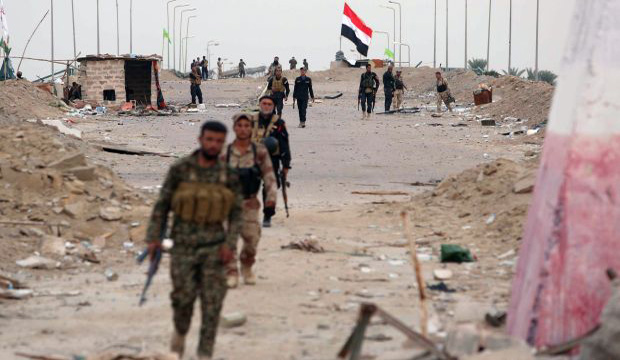
Iraqi pro-government forces walk in Jurf al-Sakhar, south of Baghdad, on October 27, 2014 after they retook the area from Islamic State of Iraq and Syria (ISIS) jihadists over the weekend after months of fighting. (AFP/Mohammed Sawaf)
Baghdad, Asharq Al-Awsat—Iraqi troops are preparing to retake the town of Amiriyah Fallujah in Anbar province from the Islamic State of Iraq and Syria (ISIS), after claiming to have regained the initiative in the fight against the terrorist group.
Babil Operations Command issued a statement on Wednesday confirming that Iraqi forces are advancing towards the town as part of the broader Iraqi military offensive against ISIS.
“Army, ‘national mobilization’ forces and police forces have advanced into the Al-Oweisat region [6 miles, or 10 kilometers, east of Amiriyah Fallujah],” the statement said. It added that ISIS had placed landmines on the main road towards the town, and that the military and security forces were proceeding slowly on secondary roads while also attempting to dismantle the devices.
The move comes as a senior Iraqi commander leading a military operation to liberate ISIS-held territory told Asharq Al-Awsat that Iraqi forces had begun “to regain the initiative after ISIS had previously been the one advancing.” The military officer spoke to Asharq Al-Awsat on the condition that his name, along with his location, remained secret.
He praised the Iraqi soldiers who have taken up the fight against ISIS, saying that Iraq’s military and security forces had now broken through the “psychological barrier” that had surrounded ISIS’s unwavering advance across parts of northern and western Iraq and that it was the Iraqi forces who were now advancing.
“The most important shift in the battle against ISIS came following the battle of Yusifiyah and the liberation of areas such as Al-Karaghoul and others, with ISIS fighters being driven back across the Euphrates to Jurf Al-Sakhar. We lately liberated Jurf Al-Sakhar and cleared it of ISIS fighters. Our forces are now the ones who have taken the initiative and are advancing,” the officer said.
ISIS fighters fled Jurf Al-Sakhar to nearby Amiriyah Fallujah, which Iraqi forces are now poised to retake, over the weekend. It was unclear on Wednesday whether ISIS intended to seek to contest the army’s advance on the town, continue to flee westwards, or launch a counter-offensive against the advancing Iraqi forces.
The Iraqi military commander attributed the change in the situation on the ground to a number of factors, but said one of the most important was a shake-up in the upper ranks of the Iraqi armed forces.
“A number of Iraqi military commanders have been changed, including the leadership of the military commands in Babil, Salah Al-Din and elsewhere,” he said.
“There is also more coordination between the army and the ‘national mobilization’ forces. These [tribal] forces have become more disciplined and are now following the orders of the military command, which is an important factor in terms of the unity of command and control,” he added.
Following the appointment of new Iraqi Prime Minister Haider Al-Abadi, Baghdad has increasingly sought the cooperation of local Sunni tribes in the fight against ISIS.
In comments to Asharq Al-Awsat, Dulaim tribal chief Majid Al-Ali Al-Suleiman confirmed that Abadi had pledged to arm and train 30,000 Anbar tribesmen to fight against ISIS, in addition to a number of Sunni Arab tribes who have already taken up arms against the group.
“Our fighting style against ISIS has also changed, which surprised and confused the enemy,” the Iraqi military commander added, in reference to the increased coordination between Iraqi volunteer forces—including tribal fighters—and military forces.
